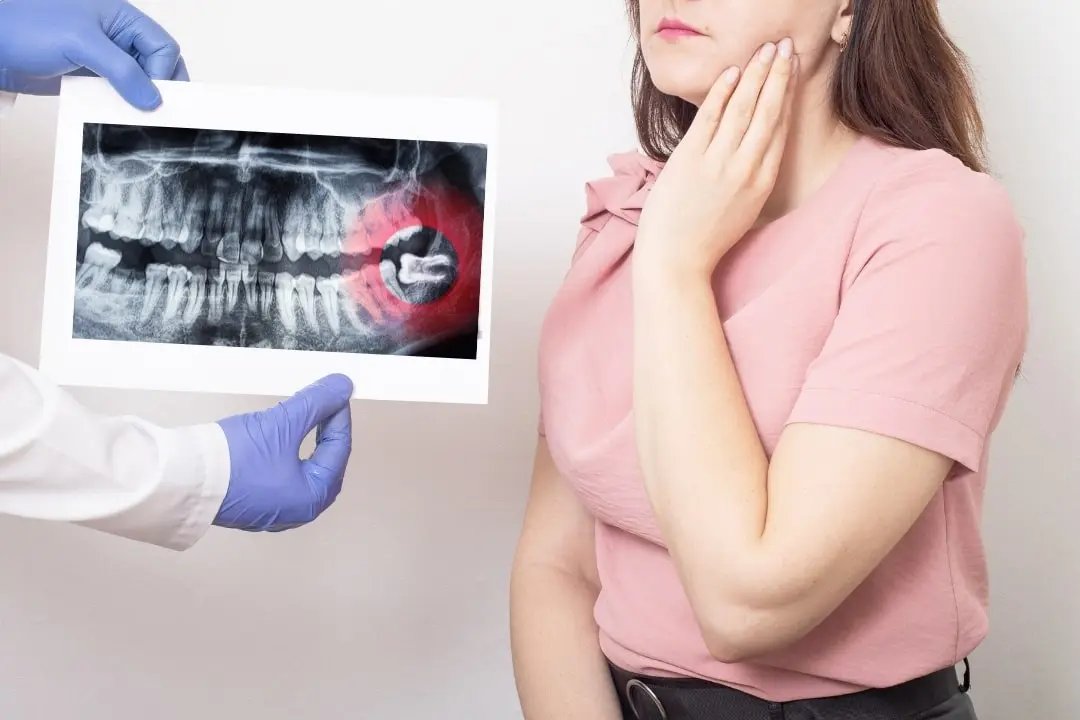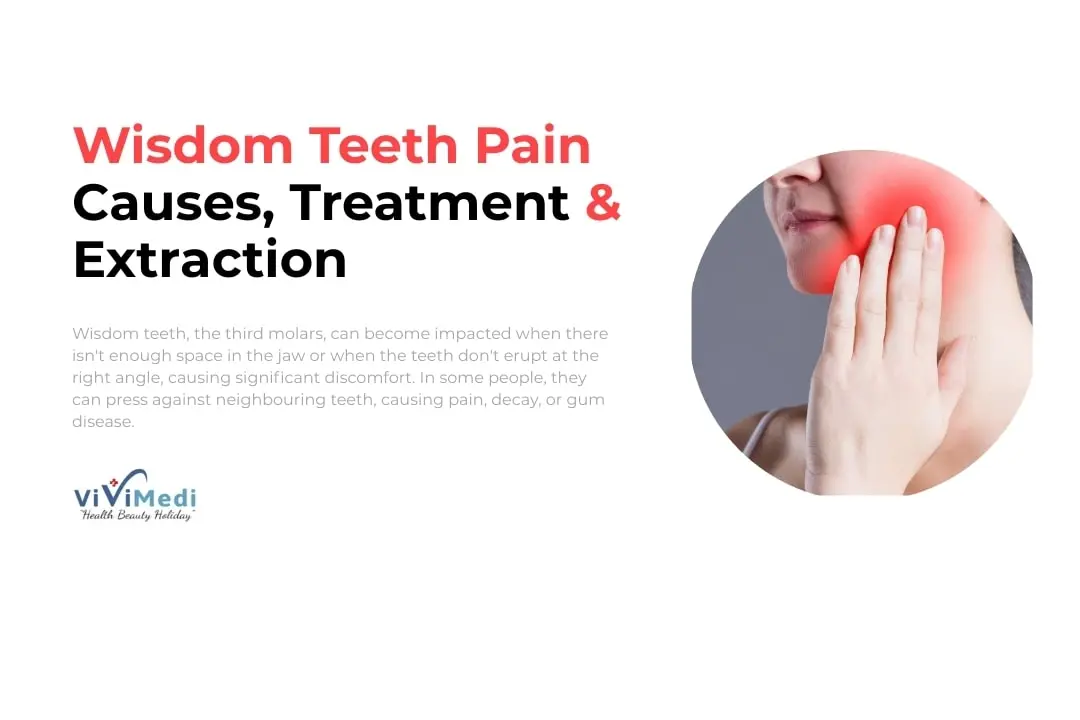About wisdom teeth pain
The wisdom teeth, which are the third molars located at the very back of the mouth, usually emerge between the late teens and early twenties. These teeth form the third and final group of molars. However, when there is insufficient space in the jaw or the teeth do not emerge at the correct angle, they may remain impacted, which can cause serious discomfort.

Wisdom tooth pain is comparable to the discomfort experienced during a child’s teething period. During the eruption process, swelling and sensitivity may occur in the gums. While the teeth may erupt without issue in some individuals, in others they may remain impacted, putting pressure on neighbouring teeth and potentially causing pain, decay, or gum disease.
For these reasons, dentists may recommend wisdom tooth extraction. Even teeth that are asymptomatic but have a high risk of future problems may need to be extracted as a preventative measure.
Causes of wisdom tooth pain
Symptoms;
Wisdom teeth don’t always cause symptoms, but when an impacted or crooked wisdom tooth becomes infected, damages other teeth, or causes other dental problems, you may experience one or more of the following symptoms:
- Jaw pain, swelling, or stiffness.
- Gum swelling, tenderness, or bleeding.
- Difficulty opening the mouth or chewing.
- Facial swelling.
- Bad breath.
- Food getting stuck and difficult to clean.
Causes;
Wisdom teeth usually begin to erupt between the ages of 17 and 21. While some people find a place behind the second molars without any problems, they often become trapped due to a narrow jaw and become impacted. Impacted teeth may partially erupt, fail to erupt at all, or grow at an uneven angle, putting pressure on surrounding tissues.
In cases of partial impaction, the gum covering the tooth can easily become inflamed. Food debris and bacteria accumulate in this area, causing infection, swelling, and pain. This condition is called pericoronitis. In some cases, an abscess can develop, gum redness can occur, and a bad taste or persistent odor can occur in the mouth.
Completely impacted or improperly erupted teeth can put pressure on neighboring teeth, leading to alignment issues or cavities. Because cleaning is particularly difficult in the back area, both the wisdom tooth and the adjacent tooth are at risk of decay. Additionally, the growth of the upper teeth into the cheek can cause trauma, irritation, and pain during chewing.
In conclusion, the most common causes of wisdom tooth pain are impaction, infection, inflammation, and pressure on adjacent teeth. When these symptoms are noticed, a dental checkup is crucial to prevent more serious problems in the future.
Treatment of wisdom teeth pain
Wisdom teeth pain can cause a variety of problems, ranging from mild discomfort to serious infections, and treatment is tailored accordingly. If there is mild sensitivity and pain in the gums, regular oral hygiene and the use of antibacterial mouthwash can provide short-term relief. Applying ice to the painful area or using painkillers can also provide temporary pain relief.
However, if the problem is caused by inflammation or an impacted tooth, temporary methods alone may not be sufficient. In this case, a dentist can professionally clean the area and, if necessary, prescribe antibiotics to control the infection. In cases of recurring pain, decay, or pressure on adjacent teeth, tooth extraction is the preferred permanent solution. Wisdom tooth extraction may be unavoidable, especially when there is insufficient space in the jaw or when the tooth cannot be cleaned.
In short, treatment varies depending on the source and severity of the pain; however, in cases of severe or recurring pain, the most appropriate approach is to consult a dentist to plan the appropriate treatment.
Medical solutions for wisdom tooth pain
Wisdom tooth pain, especially if it’s caused by impacted teeth, can be quite distressing. Various medical solutions are available to alleviate this type of pain.
Benzocaine
Benzocaine gels can temporarily relieve pain. These numbing agents, which can be applied directly to the gums, provide relief, especially when the pain is present. Dentists recommend this treatment method specifically for its analgesic effect. Drying the area before application can provide more effective results.
Ibuprofen & Aspirin
Anti-inflammatory medications such as ibuprofen and aspirin are also highly effective for pain relief. These medications not only relieve pain but also reduce surrounding inflammation, helping the problem resolve more quickly. This medication is usually available over-the-counter and should be taken according to the instructions.
Other medical solutions that may help include:
Acetaminophen (Tylenol) is another preferred medication for pain management. However, high doses can have toxic effects on the liver, so it should only be taken at the recommended dosage.
Acupuncture can be used as an alternative method to relieve wisdom tooth pain. Various studies show that acupuncture helps relieve toothaches. It can be a particularly effective method for reducing pain after tooth extraction.
Finally, advanced numbing gels and painkillers can also expedite the healing process. However, if the pain doesn’t subside with temporary solutions, your dentist may recommend extraction or other treatment.
Wisdom tooth extraction: Process and recovery
A wisdom tooth extraction is a surgical procedure performed when teeth do not erupt properly and cause various dental problems. A wisdom tooth extraction is usually necessary in the following cases:
- Gum disease, also known as gingivitis or periodontal disease.
- Dental decay in partially erupted wisdom teeth.
- Cysts or tumors related to the wisdom tooth.
- Wisdom teeth damaging surrounding teeth.
- Preventing potential future problems.
The extraction procedure is usually performed under local anesthesia. The dentist or oral surgeon numbs the area and begins removing the tooth by applying pressure. During the extraction, small incisions may be made in the gums surrounding the tooth, which can be broken into smaller pieces to facilitate its removal. This procedure usually takes 20-40 minutes.
Post-extraction pain and swelling may last for 1-2 weeks. Swelling, bleeding, and difficulty with jaw movement may also occur after the procedure. Throughout the treatment process, your doctor will provide relief with methods such as painkillers and cold compresses.
In some cases, your dentist may recommend removing your wisdom tooth to prevent future problems. Extractions are usually performed as an outpatient procedure, meaning you can return home the same day.
Natural solutions for wisdom tooth pain
Wisdom tooth pain can be a severe discomfort that makes daily life difficult. Until you see a dentist, there are some natural methods you can try at home to alleviate this pain.
Rinsing your mouth with warm water mixed with a little salt, repeated several times a day, is effective. Salt water gargling reduces bacteria, lowering the risk of infection and soothing the gums.
Applying an ice pack to the painful area reduces swelling in the jaw and may alleviate pain through the numbing effect of the cold.
Cloves and clove oil provide quick relief from toothache thanks to their anaesthetic properties. You can place a clove directly on the painful area or soak cotton wool in clove oil and apply it to the gums.
Peppermint oil provides a cooling sensation with its menthol content and soothes the gums. Peppermint tea can also be used as a gargle after it has cooled down.
These methods only provide temporary relief. If the pain is severe or recurrent, you must consult your dentist for a permanent solution.
Why do some experts now say wisdom teeth shouldn’t be removed?
Some experts argue that removing wisdom teeth isn’t always necessary. In the past, these teeth were considered teeth that should be removed as soon as they began to emerge. However, in recent years, many dentists have emphasized that not all individuals require this surgery.
Many experts argue that there is no proven benefit to removing asymptomatic wisdom teeth, meaning those that don’t cause problems. Some wisdom teeth that appear healthy and properly may not cause any discomfort, and in this case, extraction can only mean unnecessary pain, swelling, and expense. Furthermore, even a routine extraction can lead to the risk of infection, nerve irritation, and lengthy healing processes. If your tooth is free of pain, swelling, or impaction, many experts recommend leaving it as is and monitoring it with regular checkups.
This new approach is based on the “watch and wait” principle. Instead of extracting wisdom teeth in every case, dentists now make a decision based on each individual’s specific situation. This is a more personalized approach and offers many people the opportunity to keep their wisdom teeth without any problems.
When should you visit the dentist for wisdom tooth pain?
If you are experiencing any of the following symptoms related to wisdom tooth pain, it is time to see a dentist:
- If your wisdom teeth are causing severe pain.
- You have a bad or metallic taste in your mouth.
- If you notice swelling or redness in your gums or you have difficulty opening your mouth.
You should definitely make an appointment with your dentist.
When you experience these symptoms, your dentist will take an X-ray to check the condition of your wisdom teeth and determine the cause of the pain before deciding on treatment. If there are problems with the position of the tooth, more permanent solutions such as extraction of the wisdom tooth may be recommended.
Don’t ignore wisdom teeth pain – at ViviMedi dentistry we’re here to help!
Wisdom teeth pain is a common problem, but it can be managed with the right treatment.
Home remedies for wisdom tooth pain may provide temporary relief, but when the pain in the tooth increases and becomes uncomfortable, seeing a dentist is the best course of action.
ViviMedi in Antalya offers comprehensive dental services, including oral surgery and wisdom teeth extraction. You can receive all the treatments necessary for your health and comfort from a professional who knows you. To make an appointment, visit our website or contact us on +447441938016.


